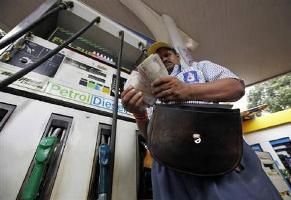Diesel has had six straight decreases since it was formally deregulated last year.
 The months-long crash in global oil prices is a major component of the favourable economic environment that the government can take advantage of to revive India’s investment climate.
The months-long crash in global oil prices is a major component of the favourable economic environment that the government can take advantage of to revive India’s investment climate.
From between $110 and $120 a barrel when the Narendra Modi-led government was sworn in last year to around $45 a barrel last month, the fall in prices will reduce costs in the economy, reduce the burden on the government when it comes to various subsidies and ease the current account deficit.
The government has also taken advantage of this fall smartly, by following through with the previous government’s gradual easing out of fuel subsidies.
Now, retail prices of both diesel and petrol are decontrolled.
In addition, the government also sensibly raised excise duties on both these fuel items to shore up its revenues without letting that impact inflation in the form of higher retail prices.
This was possible as the oil marketing companies could absorb the higher duties in view of the falling international crude oil prices.
However, the deregulation of pricing is yet to be properly tested.
After all, regular changes in price must be allowed to work both ways. So far, there have been a startling 10 straight reductions in the price of petrol.
Diesel, meanwhile, has had six straight decreases since it was formally deregulated last year.
However, what happens when global oil prices head upward again? This is the point at which a truly deregulated domestic price would respond, too. However, there are some worrying signals.
The president of the ruling party, Amit Shah, for example, repeatedly took credit on the campaign trail for lower prices, as did the Union home minister, Rajnath Singh.
Even the prime minister has mentioned lower fuel prices, though he has specified that it is because of his 'luck'.
This does not aid in the depoliticisation of the issue. That seems short-sighted because it means that a government that takes credit for low prices may struggle to avoid blame for higher prices.
And prices have increased by $10 a barrel quite sharply in the past weeks -- by over 20 per cent.
Indian oil marketing companies are typically selling oil bought at prices several weeks old, so there need be no immediate impact on their pricing decision. But soon there must be.
Then, will oil marketing companies be allowed to increase prices the same way they would if they were independent profit-maximisers?
This turns on an important political question: what will be the ruling Bharatiya Janata Party’s policy response to its humiliation in the recently concluded Delhi Assembly elections?
The Aam Aadmi Party, which won 67 of Delhi’s 70 seats, is known for its populist stand on the pricing of commodities and of energy.
Will the BJP and its leader, the prime minister, see the AAP’s unprecedented success as a signal from voters that prices are still politically popular enough to win elections?
Other reformist moves also hinge on this answer -- the deregulation of the price of urea-based fertilisers, for example, that has long been promised but not yet implemented. The government must take the long view.
To revive the economy it needs healthy finances.
And that means that not allowing the rise in international crude oil prices to pass on to consumers in the form of higher retail prices is just not affordable.
If international crude oil prices have increased, retail petroleum product prices, too, should go up.
And as seen in the past, price increases in small doses are easier to implement instead of a sharp increase that will become necessary if a price hike decision is postponed for long.












 © 2025
© 2025